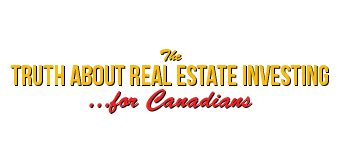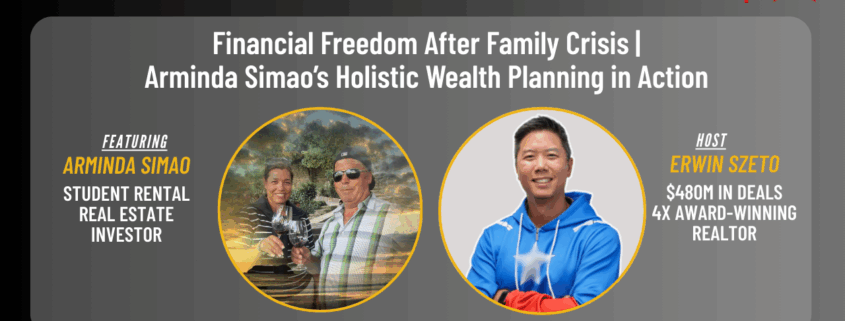Apartments vs. Business Income: How Real Estate Investing Is Evolving in 2025

Recorded: October 2025
Guest:️ Elizabeth Kelly, award-winning real estate investor, coach, and long-time educator
Host: Erwin Szeto, The Truth About Real Estate Investing for Canadians Podcast
In 2025, the phrase “buy a duplex, add a suite, and live off the cash flow” doesn’t hit the same. The numbers literally don’t work when existing suited houses can be acquired for less $$.
Canadian investors in Ontario, Quebec and BC (so the vast majority) are waking up to a new reality: the old formulas don’t work anymore. Rates are higher, values are soft, and “passive income” is harder to find north of the border.
So what’s next?
To unpack that, I sat down with Elizabeth Kelly — an award-winning real estate investor, coach, and long-time educator who’s been through multiple market cycles. Elizabeth built a 100+ unit portfolio, ran a full property management business in Northern Ontario, and today coaches investors on how to build real cash flow and resilience.
Her message was clear: the future of investing looks less like “apartments” and more like “businesses.”
The New Reality: Cash Flow Is Built, Not Bought
Back in the early 2010s, Elizabeth and her husband could buy small-town multis with 5% down, get conventional financing, and cash flow from day one.
Fast-forward to 2025: those days are gone.
“You can’t copy a 2016 playbook and expect it to work in 2025,” she says. “Today, you have to build cash flow — not hope for it.”
That means thinking like an operator, not just a landlord. The investors winning today are adding business income inside their properties — things like short-term rentals, storage, office rentals, or service-based tenants (salons, laundromats, co-working).
Her own Northern Ontario building is a 33,000-square-foot former seniors’ home with multiple income lines: long-term rooms, offices, Airbnb units, and a salon.
One property. Many businesses. Real cash flow.
The Problem With “Government-Backed” Investing
In the last few years, everyone and their cousin has been chasing CMHC MLI Select financing. Cheap debt, long amortizations — what’s not to love?
Elizabeth’s warning: don’t build your business on government promises.
“I don’t trust the government to keep giving cheap money forever. If policy changes, your whole model collapses.”
She insists her portfolio must work without CMHC. The government may subsidize your project today — but the policy winds shift fast. If your deal only works with special financing, it’s not a deal.
From FOMO to Fundamentals
Elizabeth spends much of her coaching time helping investors get out of trouble — overleveraged BRRRRs, private loans at 10–12%, or multifamily flips stuck mid-renovation.
The root cause? FOMO and blind trust.
“Too many investors handed off their judgment to brokers or mentors without understanding the math,” she says. “Education comes before execution.”
She and her husband once spent $65,000 on mentorship and courses — and she says it saved them hundreds of thousands in mistakes.
In 2025, education isn’t optional. It’s survival.
The “Buy Box” That Fits You
Every investor has a buy box — whether they know it or not. It’s your unique mix of:
- Cash flow needs
- Risk tolerance
- Time commitment
- Tenant type comfort
- Capital available
Elizabeth’s advice: stop copying someone else’s playbook.
Your buy box should match your lifestyle — not your friend’s or your Instagram feed.
If you’re too busy or risk-averse to self-manage tenants, consider passive, managed options like U.S. single-family rentals (SHARE) or private lending with conservative LTVs.
If you’re hungry for higher returns, be ready to operate like a business owner — not a spectator.
Partnerships and Private Lending: Trust, Verify, and Control
After seeing partnerships implode, Elizabeth now only partners with people who bring capital, competence, and character.
“My reputation is worth more than any one deal,” she says.
For private lenders, she warns: if you’re not ready to take over the property, you’re not ready to lend. Always be on title, know your LTV, and underwrite the borrower’s plan yourself.
And if you wouldn’t want to own that exact property in that exact neighbourhood? Don’t lend on it.
The End of “Passive” Canada?
With high prices and thin margins, truly passive real estate investing in Canada is nearly extinct.
That’s why more Canadians are exploring U.S. single-family rentals, where landlord laws are friendlier, PM fees are success-based, and you keep full title control. (That’s what we do at SHARE — simple, cash-flowing homes in stable markets.)
Whether you go cross-border or stay local, the rule is the same:
Control your income, don’t chase someone else’s yield.
Life Balance, Cryo Therapy, and the Bigger Picture
After all that talk about resilience, Elizabeth and I agreed on one more thing: take care of yourself.
Her go-to recovery tool? CryoStrong in Markham and Scarborough — a two-minute, -120°F cold therapy chamber that boosts energy and reduces inflammation.
Because at the end of the day, financial freedom means nothing if you’re too burned out to enjoy it.
🎧 Listen to the full episode here
Final Thought
Real estate is no longer a passive asset game.
It’s a business — and your success depends on how well you can adapt, operate, and create value.
“Build resilience and flexibility,” Elizabeth says. “Pivot faster than everyone else.”
Rapid Fire: 10 Questions & Answers For Elizabeth Kelly
- What real estate strategies still work for Canadian cash flow in 2025?
Mixed-use, legal STRs, and commercial-adjacent plays that add a business to the building—so you can force income instead of waiting for appreciation.
- Should investors rely on CMHC/MLI Select for multifamily deals?
No—treat subsidies as bonus, not backbone; policy can change and derail financing timelines and exits.
- How can I define a real estate “buy box”?
Match property type, tenant profile, market, and activity level to your goals, risk tolerance, and time—your buy box, not someone else’s.
- Are partnerships safe for first-time investors?
Only if incentives, capital depth, and execution ability check out—and you can underwrite the deal yourself.
- Is private lending still worth it in Canada?
Yes, when you’re on title at sensible LTVs, with clear recourse and a takeover plan; bad operators and weak collateral are the real risk.
- What went wrong in New Brunswick for many investors?
Thin appreciation, higher non-owner property taxes, management challenges (even pests), and investor-driven price surges that weren’t sustainable.
- How do I “force” cash flow without a gut reno?
Add income lines: furnished mid-term rentals, STR suites where legal, small offices, storage, vending, or service tenants that fit zoning.
- What’s the fastest way to cut risk in a shaky portfolio?
Stabilize tenancy first, then refi/sell selectively; diversify income outside real estate to support debt coverage.
- Is passive income realistic for Canadian residential rentals right now?
Rare—most “passive” plays need either business income add-ons or different markets (e.g., U.S. SFRs with aligned incentives). - What mindset do investors need in uncertain markets?
Resilience and flexibility: educate, pivot quickly, and balance optimism with brutal facts.
📜 Full Transcript
The full, cleaned transcript of my conversation with Elizabeth is available here for anyone who wants to dive deeper into her journey as a real estate investor
To Listen:
On Spotify: https://open.spotify.com/episode/2kn4yxTDairBBjX7Yw8xpe?si=Ag0sdiHlRRGsYKdLG4p6dg
YouTube: https://youtu.be/hoIwjG-PJrA
🦸♂️Household Hero? Here’s Your Next Step
If you’re a Canadian investor trying to build wealth safely and sustainably, Adam’s journey has valuable takeaways.
It might be time to revisit your current strategies—real estate, lending, or insurance—and ask:
- Do your investments match your long-term goals?
- Do you fully understand how your strategies work?
- Would a more conservative approach offer better peace of mind?
Real estate remains a powerful tool for building wealth, especially with careful underwriting and due diligence. Insurance can be useful too—but only if it supports your broader financial goals.
Need help with conservative, peace-of-mind investing—backed by Wall Street-style due diligence—plus financial planning with your best interests at heart?
Until next time, happy Canadian and USA Real Estate Investing.
Erwin Szeto,
Your Cross Border Investment Guy
Why I’m Investing in the U.S.
I’ve been investing in Ontario since 2005. It’s been a great run—starting with properties in the $100Ks, now reaching $800K–$1M. How much higher can it go? I don’t know.
The remaining appreciation potential doesn’t justify the risk. That’s why I advise clients to look to the U.S., where rental properties range from $150K–$350K USD, with rents between $1,400–$2,600/month.
These cash-flowing numbers are night and day compared to Canada. Plus, landlords have rights, there’s no rent control, and income is in U.S. dollars—which are stronger than Canadian dollars.
If you don’t believe that U.S. dollars are stronger, ask 100 non-Canadians what they’d prefer to be paid in.
To regain control of your retirement, check out the cash-flow properties at:
👉 iwin.sharesfr.com
How SHARE Makes It Easier
The best part? My U.S. investments are more passive than my Canadian ones. I work with SHARE, an asset manager that guides me through the entire process.
SHARE helps with:
- Finding quality income properties
- Structuring the legal and tax side
- Managing the property manager and insurance provider
- Saving time and money with preferred rates
They even advise on when to refinance or sell. SHARE supports investors across the U.S., which is why I plan to own in Tennessee, Georgia, and Texas. It’s like having a JV partner—without giving up ownership or control.
Final Thoughts
If increasing cash flow is your goal, I don’t know of a better strategy for most Canadians. Once more: iwin.sharesfr.com is where to see what boring, cash-flowing investing looks like on the path to financial peace.
This is how I’m making real estate investing great again—for my family and hopefully for yours too.
Sponsored by… Me!
This episode isn’t sponsored—except by my wife Cherry and me. Real estate investing is our life. It’s helped us build wealth and achieve peace of mind about retirement and our children’s future.
Interested in our systematic approach to real estate investing—the same one used by most of my podcast guests? Then check out:
📍 infinitywealth.ca/events
Till next time—just do it. I believe in you.
Erwin Szeto
W: erwinszeto.com
FB: facebook.com/erwin.szeto
IG: @erwinszeto
Disclaimer
As a committed advocate for transparent and responsible investing, I want to disclose that I am an Advisor to SHARE SFR (Single Family Rental). I hold equity in the company and earn referral commissions from clients I refer.
My endorsement of their model—focusing on positive cash flow and direct ownership—is based on personal experience and belief. Still, every investor should do their own due diligence.




Leave a Reply
Want to join the discussion?Feel free to contribute!